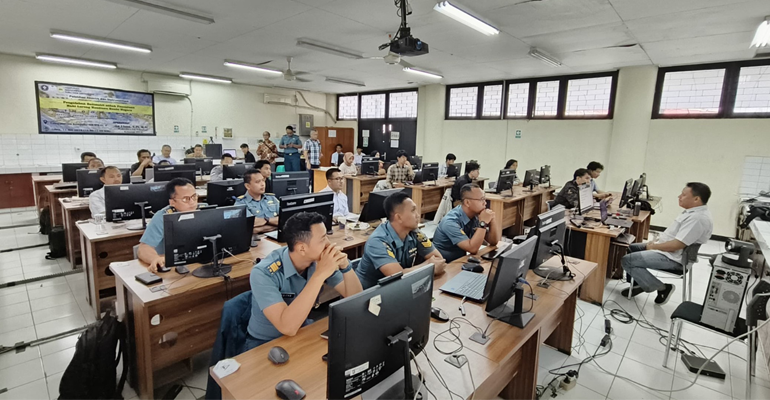Department of ITK IPB University Holds BUDEE Post-Cruise Training: Processing and Analysis of Underwater Acoustic Data

Department of Marine Science and Technology, Faculty of Fisheries and Marine Sciences, IPB University held Post-Cruise Training Series #3: Underwater acoustic data processing and analysis, 28/8. This training series is one of the activities that are part of the Banggai Upwelling Dynamics and Ecosystem Experiment (BUDEE) planned from 2022-2025.
Prof Fredinan Yulianda, Dean of FPIK IPB University advised that this training should be able to provide significant benefits in marine resource management efforts, given the large potential of marine resources owned by Indonesia.
“Our sea is a sea that is targeted by other countries because of our large sea area, but the management of marine resources to date has not been able to provide significant benefits to the nation. This is a challenge for us in marine management because judging from the size of the resources we should already be prosperous,” he said.
Prof Agus Atmadipoera, BUDEE Coordinator, revealed that this program is a program endorsed by UNESCO-IOC WESTPAC for the Cooperative Study on Kuroshio (CSK-2) research program. This program also contributes to the UN Decade of Ocean Science 2021-2030.
“This UNESCO program focuses on the study and management of marine science and oceanography in the Western Pacific region. Through this BUDEE we want to investigate how the dynamics of Banggai waters correlate with the conditions of Kuroshio waters,” said Prof Agus Atmadipoera, Professor of Physical Oceanography at IPB University.
This series, continued Prof Agus, presented two speakers, namely Prof Henry Manik from the Department of Marine Science and Technology and Asep Priatna, MSi from the National Research and Innovation Agency.
The two marine acoustic experts explained the basic principles of marine acoustics to the application of marine acoustics and its relation to other disciplines. For example, by calculating the strength of the back reflection of sound waves from certain objects such as the seabed, sediments, and fish, we can identify the profile of the seabed and sediments and estimate the abundance of fish or planktonic organisms in a body of water.
“The calculation of the bottom backscattering strength (BS) value helps us identify the topography of the seafloor. In addition, we can also find out the seabed sediments based on the SS value and verified with sediment coring data,” explained Prof Henry, IPB University Professor of Underwater Acoustics and Marine Instrumentation.
Asep Priatna as a researcher from BRIN continued, ” Underwater Acoustics and Marine Instrumentation is also a very necessary tool in fisheries studies. The application of acoustic methods provides information on species, location, and habits which are important for fisheries management and fisheries ecology studies,” he concluded.
In the practical session, participants were given the task of analyzing acoustic data for pelagic and demersal fish. Participants were also given the task of identifying sediments based on SS values and spatially mapping SS values as a condition for obtaining a certificate and credit conversion of two credits for undergraduate students. For information, the training series is planned into nine themes. In the future, this activity will not only collaborate with domestic agencies and academics, but also from the international arena.
“We are working on joint-lab analysis, hopefully we will get good news soon,” hoped Prof Agus. (RAT/ra) (IAAS/SHY)



